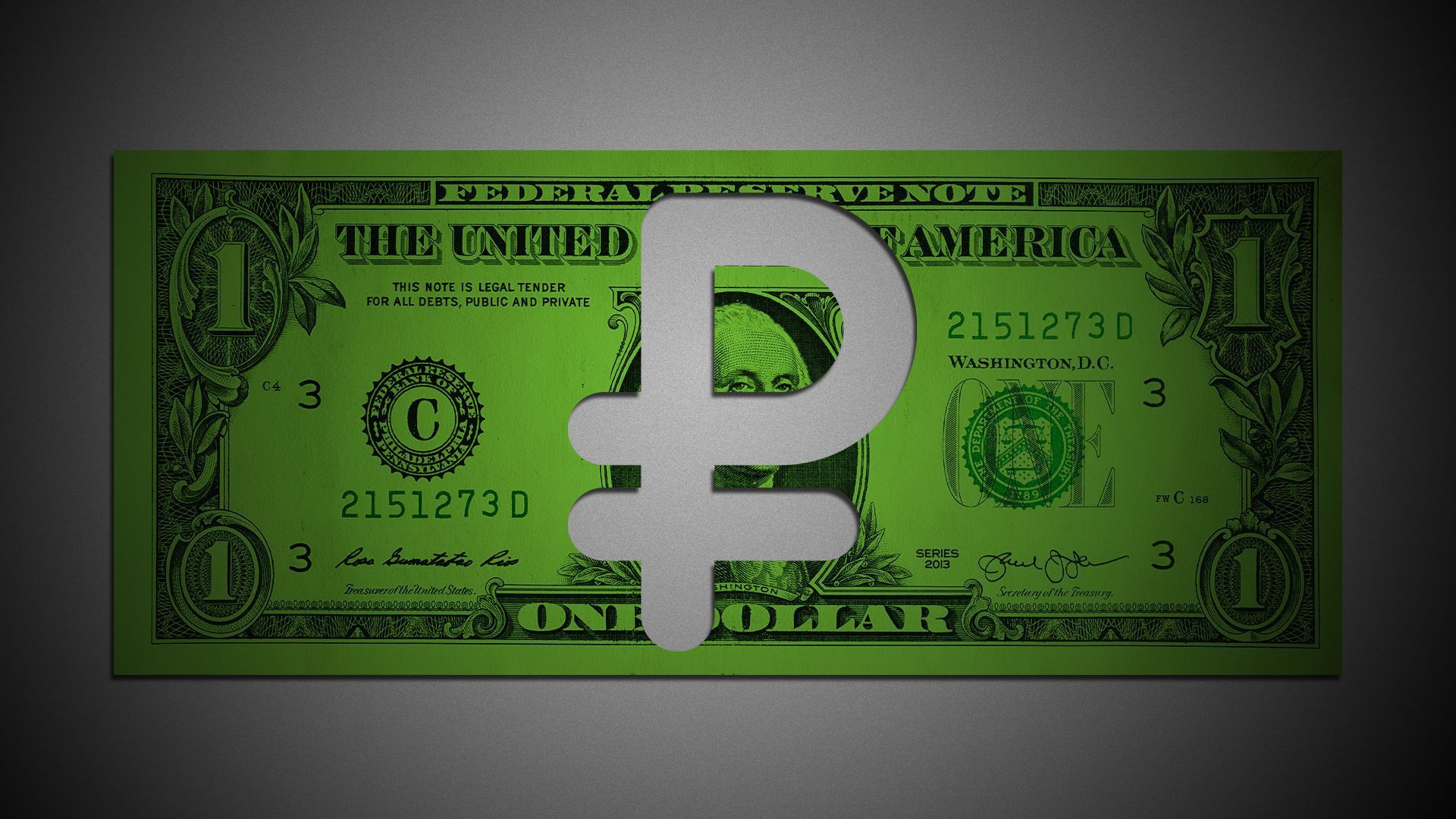| | | | | | | | | | | Axios Markets | | By Emily Peck and Matt Phillips ·Mar 07, 2022 | | 🙃 Mondays, amiright? We're here to talk oil (⬆), sovereign bonds and oligarchs. 📈 But first, on Friday we asked for your best guesses on the February jobs report. Wall Street predicted around 400,00 jobs added and most of you were slightly more pessimistic. The number was larger: 678,000. Read our story. Today's newsletter is 1,186 words, 4.5 minutes. | | | | | | 1 big thing: Russia could default on its bonds |  | | | Illustration: Aïda Amer/Axios | | | | One of the big questions looming in the economic war against Russia: what happens to its sovereign bonds? The Russian government has borrowed about $49 billion in dollar- and euro-denominated bonds, and owes a series of interest payments to bondholders in the coming months, Axios' Kate Marino writes. Why it matters: If Russia defaults on its debt, it will play out differently than sovereign defaults of the past — and investors are watching for signs that it could ripple out into a broader market dislocation as Russia's 1998 ruble debt default did. - "The default risk is real," George Catrambone, DWS Group's head of Americas trading, tells Axios.
- And the market for Russian bonds is in uncharted territory, effectively frozen. There are few buyers, and some clearinghouses won't execute trades, he says.
The latest: A decree signed by Russian President Vladimir Putin over the weekend said that Russia can pay foreign creditors — but only with rubles, which are rapidly depreciating, Bloomberg reports. The big picture: Muting the systemic worry somewhat, Russia's only a small part of emerging market (EM) indexes. - In the U.S., its bonds have been held mainly by long-only EM mutual funds (as opposed to levered hedge funds), while Western banks appear to have minimal exposure to Russian assets on the whole.
- Still, the question of market impact remains unanswerable for now, sources tell Axios.
And adding to overall market jitters, other EM defaults could pile up. - Belarus and Ukraine government bonds are trading like they're going to default — and Russia's economic contraction along with higher commodity costs could tip others into distress, says Mitu Gulati, a law professor at the University of Virginia who focuses on sovereign debt restructuring.
State of play: Whether Russia defaults on its external bonds will depend both on the country's willingness to pay principal and interest amounts as they come due (unlikely, considering the West froze a bunch of its money) — and its ability to transfer the payments (an open question, given the sanctions), says Lee Buchheit, a veteran sovereign debt-restructuring lawyer, now at the University of Edinburgh. - A debt default is usually bad for the defaulting nation, which gets a huge blemish on its credit score, and is essentially cut off from the global capital markets for a time while it works out a deal with creditors.
- Yes, but: Russia's already cut off from the markets — by virtue of sanctions imposed by the U.S. and its allies. And the state of open hostility (Putin described the sanctions as a declaration of war) will make a debt restructuring deal near impossible to achieve.
Keep reading. |     | | | | | | 2. Catch up quick | | 🛢️ The Biden admin. weighs cutting Russian oil imports. (Reuters) ⬆Oil prices soar. (FT) Gas hits $4 a gallon. (CNN) 💳 Visa, Mastercard and Amex suspend operations in Russia. (Axios) 👀 Bed Bath & Beyond in sights of billionaire investor. (WSJ) |     | | | | | | 3. What the Ukraine war means for global growth |  Data: FactSet; Chart: Axios Visuals Economic forecasters are starting to plug the effects of the Ukraine war into their models. It doesn't look good, especially for Europe, Axios' Neil Irwin writes. Why it matters: Much of the world is set to experience weaker growth and higher inflation than seemed likely mere weeks ago. And that's assuming some of the more dire possibilities that further escalation of the conflict could bring don't materialize. The big picture: Soaring energy prices are the most direct channel through which the world economy stands to be battered by the conflict. But rising prices for other commodities will also fuel inflation and could disrupt supply lines. - These forecasts were made last week before a new surge in oil futures overnight Sunday into Monday that will only intensify these pressures.
- Moreover, geopolitical risk has tightened financial conditions, which could constrain investment — though that effect is modest so far.
By the numbers: Economists at JPMorgan said Friday they expect the world economy to grow 0.8 percentage points slower in 2022 than they did on Feb. 18. - They marked down their U.S. growth forecast only slightly, by 0.1 percentage point, while knocking the eurozone growth projection down a whopping 2.1 percentage points.
- The JPMorgan team envisioned a more substantial effect on inflation in the U.S., with the crisis pushing their forecast for the Consumer Price Index in the fourth quarter up by a full percentage point.
At Goldman Sachs, economists see the rise in oil prices so far as likely to subtract 0.2 percentage points from U.S. growth in 2022, with the rise in food commodity prices subtracting another 0.1 percentage point. That would worsen if prices continue soaring upward. The bottom line: Conditions remain highly uncertain, and further escalation would expand the economic risk. But already Ukraine looks like a meaningful headwind for the world economy in 2022. |     | | | | | | A message from Axios | | Equip your team with better information | | |  | | | | In times of uncertainty, efficient information matters more. How it works: Axios Pro daily newsletters deliver updates in our signature smart brevity style, giving your team more time to focus on what's important. Learn more about Axios Pro corporate subscriptions today. | | | | | | 4. 🛢 Clearance on Russian oil |  Data: Refinitiv; Chart Axios Visuals Russia's Urals grade of oil is trading at a record discount to global benchmarks, as shippers and oil buyers have turned their back on Russian supplies, Matt writes. Why it matters: The discount shows that uncertainty around the Russian invasion — and the severe Western sanctions that followed — has nearly overpowered the basic market logic of "buy low, sell high." Details: Multiple reports have noted that shippers, insurers and financiers have grown leery of facilitating trade in Russian crude, for a range of reasons. - For one, a large amount of Russian crude is shipped out of its southern Black Sea port of Novorossiysk, not far from the war on Ukraine's southern coast. (Commercial vessels have been destroyed in recent days.)
- Also, they're worried about violating sanctions by doing business with Russian entities, or even entities that could be sanctioned in the future.
What they're saying: "A large number of oil tanker owners are taking a caution-first approach until the full picture on sanctions is clear. Big international energy consumers are also mindful about reputational damage if they handle Russian barrels," wrote analysts at JPMorgan last week. Yes, but: At some point, the price of Russian oil just may be too good to pass up. - Europe's largest oil company, Shell, bought a boatload of Russian oil on Friday, at what is reported to be a record discount of $28.50.
|     | | |  | | | | If you like this newsletter, your friends may, too! Refer your friends and get free Axios swag when they sign up. | | | | | | | | 5. Oligarch watch: Abramovich edition |  | | | Roman Abramovich (L) looks on as Russian President Vladimir Putin (R) speaks in 2016 at the Olympics in Sochi, Russia. Photo: Mikhail Svetlov/Getty Images | | | | Russian billionaire Roman Abramovich's rise into the billionaire class and philanthropic track record comes up for close scrutiny in a must-read investigation published late last week in Jewish Currents titled "Our Oligarch," Emily writes. Why it matters: The piece comes at a bad time for Russian oligarchs. Their yachts are getting seized, and they're facing escalating sanctions from the U.S., European Union and the United Kingdom. "Abramovich is perhaps the most visible of the "oligarchs" surrounding Putin," writes David Klion. "[They] are widely perceived as extensions of the Russian president and keepers of a vast fortune that is effectively under the Kremlin's control." - Last week, Biden announced the Justice Department was forming an oligarch task force. Klion says the White House is considering specific sanctions against Abramovich, who so far has not been sanctioned.
- The 55-year-old said he'd sell his U.K. soccer team, Chelsea FC, and donate money from the sale to Ukraine's war victims.
Yes, but: Despite actions like that, Abramovich has been deeply loyal to Putin, Klion writes. Read the full story. |     | | | | | | A message from Axios | | Equip your team with better information | | |  | | | | In times of uncertainty, efficient information matters more. How it works: Axios Pro daily newsletters deliver updates in our signature smart brevity style, giving your team more time to focus on what's important. Learn more about Axios Pro corporate subscriptions today. | | |  | It's called Smart Brevity®. Over 200 orgs use it — in a tool called Axios HQ — to drive productivity with clearer workplace communications. | | | | | | Axios thanks our partners for supporting our newsletters. If you're interested in advertising, learn more here.
Sponsorship has no influence on editorial content. Axios, 3100 Clarendon Blvd, Suite 1300, Arlington VA 22201 | | | You received this email because you signed up for newsletters from Axios.
Change your preferences or unsubscribe here. | | | Was this email forwarded to you?
Sign up now to get Axios in your inbox. | | | | Follow Axios on social media:    | | | | | |












No comments:
Post a Comment